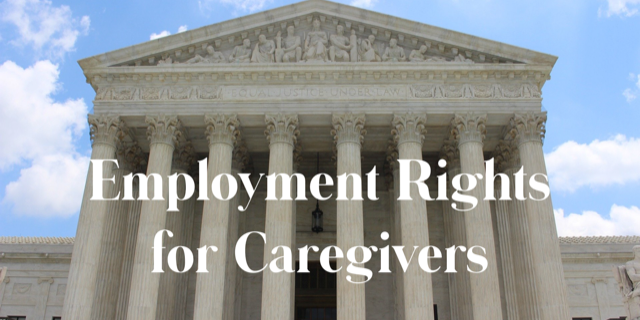During these uncertain times it is important as a caregiver to know your employment rights.
The following article written by Devin Golden for MesotheliomaGuide.com and edited here for www.KathiKollFoundation.org, pertains to ALL unpaid caregivers — but if you are specifically caring for someone with Mesothelioma please see more information in brackets below. -Kathi Koll
Choosing to be a caregiver is a selfless and giving act.
The American Cancer Society defines a caregiver as anyone not paid to provide care to a loved one. Whether a spouse, child, parent, sibling or close friend, caregivers sacrifice much of their lives to help someone in need.
Caregivers often sacrifice their professional goals and time to care for the patient. These unselfish acts should not be penalized, and caregivers should know their employment rights.
(If you’re a mesothelioma caregiver, read these laws and regulations that protect employment aspirations and situations for caregivers, and then contact MesotheliomaGuide.com with further questions. Patient advocate, Jenna Campagna, is available via email at jenna@mesotheliomaguide.com and can further assist with caregiver-related information.)
Anti-Discrimination Law
The Americans With Disabilities Act is a federal law protecting caregivers from workplace discrimination. The rule applies to companies that have at least 15 employees.
The United States Equal Employment Opportunity Commission (EEOC) explains how the act helps people with caregiving responsibilities:
“Persons discriminated against because they have a known association or relationship with a disabled individual also are protected,” the EEOC website states, clarifying that the government’s definition of “disabled individual” includes cancer patients.
Caregivers, therefore, should not be terminated from employment or denied employment if they can manage the job’s requirements. However, caregivers aren’t entitled to special treatment, such as extra time off or modifications to the workplace.
Unpaid Family Leave
Caregiving can be the equivalent of a full-time job. The Family and Medical Leave Act of 1993 (FMLA) allows eligible employees who are caregivers to take off work without losing their employment. The law provides up to 12 weeks of unpaid time off and covers a range of caregiving responsibilities such as traveling for medical appointments, post-surgical care, and staying at home when the patient cannot be left alone.
According to the U.S. Department of Labor, the law applies to all government entities, including those at the state, federal, and local levels. It also applies to private employers with 50 or more employees living within a 75-mile radius of the worksite; and caregivers who have worked for their employer for at least 12 months and at least 1,250 hours during the past 12 months.
While the rights of employees to take family or medical leave have greatly expanded under the recently enacted Emergency Family and Medical Leave Expansion Act, EFMLEA leave is only available for coronavirus-related reasons.
Paid Family Leave
Not every caregiver can afford to take off weeks or months without any income. For that reason, some states have enacted paid family leave laws.
According to Conquer Magazine, five states (California, New Jersey, New York, Rhode Island and Washington) provide this service to caregivers. The National Conference of State Legislatures states that Washington D.C. also has a paid family leave law which will take effect on July 1, 2020. Connecticut, Maine, Massachusetts and Oregon have enacted similar measures that have not yet taken effect.
More states could enact similar measures, so you should check your state’s employment agency for more information.
by Devin Golden
Original article published for Mesothelioma Guide, December 2019.
As a caregiver it is crucial to know your employment rights. But also keep in mind that many companies can be more generous and flexible than the law so it is important, whatever your caregiving situation, to discuss your circumstances with your manager or human resources representative. Thank you for reading and be well. -KK
To make an online donation to The Kathi Koll Foundation, please click here.


